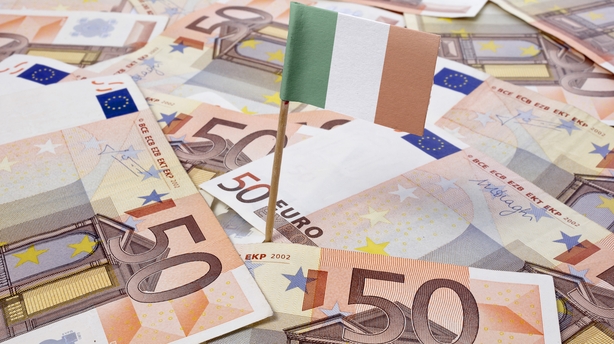Gross Domestic Product - or GDP, as it's better known - is the internationally recognised measure of the economic activity of a country.
When it comes to Ireland's GDP, it can represent something of a fantasy, putting us at the top of the euro zone league table and up there with the likes of Singapore and Switzerland on a measure of per capita wealth.
It was once spoken of in the realm of 'leprechauns' - such is the degree of incredulity with which the numbers are greeted abroad.
However, it is the official measure and one that we totally dismiss at our peril.
While we can perhaps overlook it at times of apparent great largesse, when it shows signs of weakness it would be shortsighted of us not to give it some closer examination.
Why is our GDP so out of kilter?
In short, because of the activities of a number of big multinationals here.
The transfer and depreciation of intellectual property assets as well as the headquartering of a number of aircraft leasing companies has had an outsized impact on the data.
Measures like Gross National Income (GNI) or even the Central Statistics Office's own tailored version of GNI* (pronounced GNI star) are often used as alternative snapshots of economic performance.
However, the transfer of multinational assets here in the wake of a global clampdown on tax avoidance has made the former an unreliable indicator of economic activity.
And even the latter might not fully strip out the effect of multinationals as Professor Patrick Honohan, a former Governor of the Central Bank suggested in a paper published in 2021.
"Ireland is a prosperous country, but not as prosperous as is often thought because of the inappropriate use of misleading, albeit conventional, statistics," he commented at the time.

Why is GDP in the spotlight now?
It followed the publication of the most recent Quarterly Economic Commentary from the ESRI last week.
In it, while they emphasised that the domestic economy remains very buoyant with rock-bottom unemployment levels, good wage growth and strong consumption, they slashed the outlook for economic growth in GDP terms by around 5 percentage points to just 0.1% for 2023.
They made the assessment on the basis of an expected fall off in exports, particularly in the pharmaceutical sector, together with an increase in imports.
It could be just a one-off adjustment. After all, if a few outsized transactions can have a ballooning effect on our GDP, it could also contract severely because of a few movements by a multinational.
But it's also not implausible in the current environment - with interest rates rising and inflation still embedded at a high level in most economies - that a chill wind could be starting to blow through the international trade sector.
What's more, the pharmaceutical sector underwent strong growth in the pandemic years.
A reversal of that now could partly account for the sharp falloff in activity.
Blip or something more severe?
This is something that the ESRI, as well as others, will be keeping a close eye on in the months and quarters ahead.
The international project management contractor, the PM Group, which released its annual report on the day the ESRI outlook was published, said it was surprised by any signs of contraction in the pharmaceutical sector where it conducts a lot of work.
"I think any drop off would be temporary in nature," Dave Murphy CEO of the PM Group told Morning Ireland.
"We're seeing huge levels of investment, capital investment in the pharma sector. People like Lily in Limerick and Pfizer in Grange Castle - both of which we're working on - and Merck Sharp and Dohme are expanding in all their sites. We expect that growth to continue," he said.
The stockbroker Davy also comes down on the side of GDP weakness being a 'blip'.
Publishing its latest outlook in recent days, which also forecast a slowdown in GDP (but not nearly as severe as the ESRI), chief economist Conall MacCoille referenced the outsized contraction in Irish GDP by 4.6% in the first quarter of this year.

"We've seen double digit growth in recent years. That was artificially strong. We think the first quarter number was artificially weak," he said.
"The monthly industrial production numbers fell by 45% in March alone and then rebounded by 70% in April. These are extraordinary numbers. They are volatile," he explained.
Gerard Brady, chief economist with Ibec, points out that the volatility can often be down to individual decisions from one or more big multinationals.
He pointed to the effect on our GDP numbers that drugs going off patent had some years ago.
"Sometimes, it's reflecting noise in companies rather than reflecting the trend for the economy as a whole," he explained.
"I wouldn't read too much into the noise," he added.
Is it time to ditch the GDP measure for Ireland?
It is still the international comparator and it tells the full story for the economy, even if it bears little relationship to the everyday experience of most people.
Although it doesn't give an accurate picture of what's happening in the domestic economy, there are a range of other indicators for that performance.
Mr Brady points out that most economies have issues with their GDP.
"We've seen the UK GDP numbers move up and down because of the movement of gold in and out of the City of London, for example. That happens, even in large economies, but it's a complicated story to tell," he explained.
"Every country has a level of it. We're probably ahead by being able to dig deep into our numbers and understand the distortions and challenges that might be there," he added.
In Ireland's case, the economy is especially globalised which can have an outsized effect on our overall numbers.
We have been able to overcome that to an extent by developing other metrics - none of which will ever be perfect.
But other countries are already following our lead.
It appears we may have 'Leprechaun economics' to thank for that.







